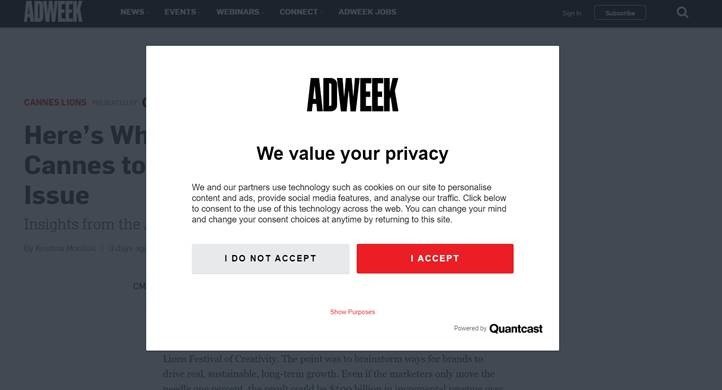Get analysis, insight & opinions from the world's top marketers.
Sign up to our newsletter.
Two months have passed since GDPR came into effect and brands are facing up to the consequences it brings for digital marketing.
For many companies, GDPR was a race towards the implementation deadline of 25th May. However, this date was far from the end of the GDPR story. Almost two months on, GDPR is still dominating the headlines. And the advertising industry is still getting to grips with what exactly GDPR means for digital marketing.
On the day that GDPR came into effect, the Wall Street Journal reported a dip in programmatic demand, prompting speculation that GDPR signalled the end of programmatic as we know it. In reality, it looks like volumes have now recovered to more or less pre-GDPR levels. But GDPR is still having an impact on the complex ecosystem of advertising technology services and intermediaries which fuel online advertising. There are reports that a number of companies have been effectively cut out of parts of the ecosystem, either temporarily or permanently, due to questions around GDPR compliance. And different legal interpretations of GDPR within the ecosystem also appear to be causing disruption.
Six months ahead of the GDPR deadline, a survey of global advertisers across WFA membership revealed that only 10% felt that their programmatic approaches were already ‘fit for purpose’ post-GDPR. 83% said, however, that this was a priority for 2018. This reflects one of the biggest challenges for advertisers working with programmatic post-GDPR: having the ability to pick apart the many, complex layers of data collection taking place within the programmatic ecosystem in order to get a clear view of what data is being collected, how it is being used and whether or not it complies with GDPR.
Ahead of the GDPR deadline WFA developed a guide in partnership with Labmatik and WFA’s Digital Governance Exchange (DGX) working group which aimed to provide marketers with some practical advice on how to manage the process of assessing GDPR compliance throughout the supply chain, including what questions to ask their agencies and how to validate the answers.
But while it could take years for courts to rule on exactly how GDPR should be interpreted, beyond GDPR the Cambridge Analytica revelations have made it abundantly clear to marketers why they need to have a firm grip on how consumer data is used to fuel their digital advertising and who has access to it. And more recently, the European Court of Justice has made it clear that all parties in the digital advertising ecosystem, including advertisers, could be liable for any breach of data protection rules – even if the advertiser has never had direct access to any of the personal data used to target ads.
This is why WFA has set up a data transparency advisory board made up of experts from across a number of different global brand owners to try and identify how to tackle this challenge. The objective of this group is to look beyond questions of legal compliance and lead a mindset shift in the advertising industry towards an ecosystem built on trust, control and respect for people’s data.
The group is looking at areas such as:
We don’t expect to solve any of these challenges immediately. We know it will take time to define exactly what our vision of the future looks like, and how to overcome the obstacles to getting there. But we feel it’s the start of a movement which is impossible for anyone in the advertising industry to ignore. And we’re looking forward to being at the centre of it.

For more information or questions, please contact Gabrielle Robitaille at G.robitaille@wfanet.org